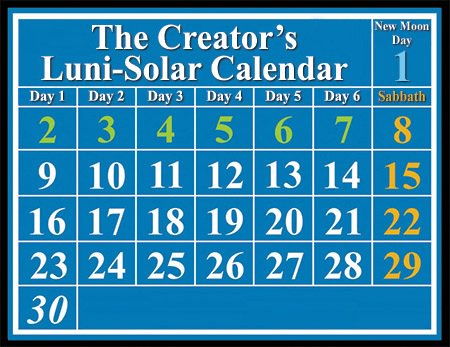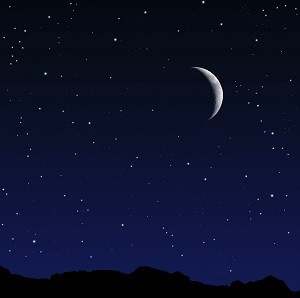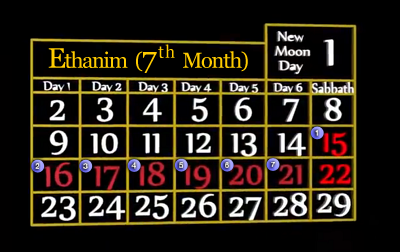"And they worshipped the dragon which gave power unto the beast: and they worshipped the beast . . . And all that dwell upon the earth shall worship him, whose names are not written in the book of life of the Lamb slain from the foundation of the world." (Revelation 13:4-6, 8, KJV)
This prophecy, recorded in the last book of the Bible, is a revealing look into the very near future. It establishes that the final conflict between the forces of Good and the forces of Evil will be over worship.
The fact that the battle over worship figures so predominantly in the prophecies of the final conflict, implies that there is something different, two warring beliefs,in the realm of worship previously not on the stage of World Religion.
This controversy can only be over the day of worship, because it is by the day of worship that one's loyalty is expressed to the deity he worships. Yahuwah Himself emphasized upon which day He was to be worshipped when He admonished:
The seventh-day is the Sabbath of Yahuwah thy Elohim. (See Exodus 20:8-10.)
In recent years, increasing light on the Sabbath has revealed a long-forgotten truth: the fact that the Biblical seventh-day Sabbath cannot be found using a pagan calendar. Only by using the ancient Hebrew calendar, the calendar of Creation, can the true Sabbath be found.
Various objections to this new and very startling truth have been raised. Some people rush to their pastors with the eager inquiry: "Are these things true?" Others are confused by apparent contradictions. Many articles and videos have been produced claiming to show the "error" in the lunar Sabbath belief.
A careful examination of Scripture reveals the truth. In the light of Scripture, the "proofs" against the lunar Sabbath are found to be inconsistent with Scripture, history and the manner in which Yahuwah works.
Following are 10 common objections raised against the Biblical Lunar Sabbath, and their respective Answers.
OBJECTION #1: "If the lunar Sabbath is true, why haven't we heard about it before? This cannot be true because God would never allow the Sabbath to be so completely lost and forgotten!!"
ANSWER: Because the Sabbath is so very important, this is an assumption many have made. However, it is an erroneous assumption. Scripture itself prophecies that the true Sabbath would be forgotten.
Yahuwah was like an enemy. He has done violence to His tabernacle, He has destroyed His place of assembly; Yahuwah has caused the appointed feasts and Sabbaths to be forgotten in Zion. (See Lamentations 2:5-6.)
When truth is not cherished as it should be, Yahuwah removes it for safe keeping. When early Christians compromised, embracing paganism, Yahuwah Himself caused the Sabbaths to be forgotten.
I will also cause all her mirth to cease, her feast days, her New Moons, her Sabbaths - All her appointed feasts. (See Hosea 2:11.)
But the promise is, that in the last remnant of time, truth would be restored:
"Because My people have forgotten Me, . . . they have caused themselves to stumble in their ways, from the ancient paths . . . ." (Jeremiah 18:15, KJV)
Thus says Yahuwah: "Stand in the ways and see, And ask for the old paths, where the good way is, And walk in it; Then you will find rest for your souls. (See Jeremiah 6:16.)
"Those from among you shall build the old waste places; you shall raise up the foundations of many generations; And you shall be called the Repairer of the Breach, the Restorer of Streets to Dwell In. If you turn away your foot from the Sabbath, from doing your pleasure on My holy day; and call the Sabbath a delight . . . ." (Isaiah 58:12, 13, NKJV)
OBJECTION #2: "The weekly cycle has come down uninterrupted from Creation. Saturday is the seventh-day of the week so of course it is the true Sabbath!"
ANSWER: Time itself is continuous. However, there are different methods for measuring that continuous time. A uninterrupted weekly cycle did not enter the calendar format until the Babylonians adopted one several hundred years before the Saviour was born. All ancient calendars had weekly cycles that restarted once a month on each New Moon, or annually at the close of the old year.
On a calendar where the weekly cycle restarts each month, the days of the week always fall on the same dates of the calendar. When the weekly cycle restarts at the New Moon, the seventh-day of every week always occurs on the 8th, 15th, 22nd and 29th days of the month.

Scripture supports this calendar format. It is significant that every time in Scripture a date is given for a seventh-day Sabbath, either directly or contextually, it always falls on the 8th, 15th, 22nd or 29th. This confirms that the Biblical calendar uses a lunar month in which the days of the week always fall on the same dates of the month.
OBJECTION #3: "The moon was created on the fourth day! Obviously, it cannot determine the Sabbath because it was not created until Day Four of Creation week!"
ANSWER: This argument is as much an argument against Saturday as it is against a lunar Sabbath. Saturday is found only in the late Julian calendar, a pagan calendar, and the modern Gregorian calendar, a papal calendar. Both the Julian and the Gregorian calendars are solar calendars. If the lights created on the fourth day cannot be used for time-keeping, then Saturday must be dismissed as well, because the Gregorian calendar is based upon the sun.
The fact is, both the sun and the moon were created by a fiat of Creation. They were created when the mind of Yahuwah conceived and spoke them into existence. Yahuwah created age into everything. Adam and Eve are perfect examples of created age. Adam was not created to be a fetus or a new born baby, but a fully-grown man. Likewise, the birds and animals were not created as unhatched eggs or blind, needy baby animals.
Just as when a jeweler sets a watch to the proper time, the Creator properly positioned the moon to accurately keep track of all time to come. When Yahuwah created the sun, He positioned it in a precise location: the exact distance from earth needed to provide the correct temperature; not too close, and not too far. He just as carefully and deliberately placed the moon in the precise position needed in order to operate His time-keeping system.
OBJECTION #4: "My pastor told me that the luni-solar calendar was used only for the feasts, NOT the Sabbath!"
ANSWER: Scripture teaches only one method of time calculation: the luni-solar calendar. Genesis 1:14 states:
"Let there be lights in the firmament of the heaven to divide the day from the night; and let them be for signs, and for seasons, and for days, and years."
The word "seasons" comes from the Hebrew word, "mo'ed."
"Mo'ed, mo'adah: congregation, festive gathering; appointment, signal. . . . [Yahuwah] met Israel there at specific times for the purpose of revealing His will. It is a common term for the worshiping assembly of . . . [Yahuwah's] people." (#4150, Lexical Aids to the Old Testament, Key-Word Study Bible.)
 "Mo'ed" is also translated "seasons" in Psalm 104:19:
"Mo'ed" is also translated "seasons" in Psalm 104:19:
"He appointed the moon for seasons [mo'adah]."
This clearly establishes that the moon was created for the express purpose of calculating the times of worship.
The feasts (mo'adah) of Yahuwah are all outlined in Leviticus 23. The very first feast listed is the seventh-day Sabbath!
And Yahuwah spoke unto Moses, saying, "Speak unto the children of Israel, and say unto them, 'Concerning the feasts [mo'adah] of Yahuwah which you shall proclaim to be holy convocations, even these are My feasts [mo'adah]. Six days shall work be done: but the seventh day is the Sabbath of rest, an holy convocation; you shall do no work therein: it is the Sabbath of Yahuwah in all your dwellings." (See Leviticus 23:1-3.)
Scripture does not present two calendars: one for the weekly Sabbath, and another for the annual feasts. Furthermore, it should be remembered that when the moon was appointed the work of establishing worship times, there were no other feasts! The only "feast" in Creation week was the weekly feast: the seventh-day Sabbath.
OBJECTION #5: "John 7-9 proves that sometimes the weekly Sabbath falls on a date other than the 8th, 15th, 22nd or 29th. In this passage, the seventh-day Sabbath falls on the 23rd after the last day of Feast of Tabernacles on the 22nd!"
ANSWER: John 7 through 9 is one of the proofs in favor of a lunar-calculated Sabbath. It clearly links the seventh-day Sabbath to the 22nd day of the seventh month. The story begins with a statement made by the Saviour on the sixth day of the week:
In the last day, that great day of the feast, Yahushua stood and cried, saying, If any man thirst, let him come unto me, and drink. (See John 7:37.)
The feast here referenced is the Feast of Tabernacles for in verse two of John 7 it states:
"Now the Jews' Feast of Tabernacles was at hand." (John 7:2)
Feast of Tabernacles is a seven-day feast, followed immediately by the seventh-day Sabbath which, in Leviticus 23, is called a "holy convocation."
Speak to the children of Israel, saying: "The fifteenth day of this seventh month shall be the Feast of Tabernacles for seven days to Yahuwah. For seven days you shall offer an offering made by fire to Yahuwah. On the eighth day you shall have a holy convocation." (See Leviticus 23:34, 36.)
 |
| The Feast of Tabernacles is a seven day feast, beginning on the 15th and ending on the 21st. |
Feast of Tabernacles always begins on the 15th day of the seventh month, or, the fifteenth day following New Moon. It is a seven day feast, ending the 21st of the month. Thus, the very next day is a seventh-day Sabbath.
John 7 to 9 supports this. Scripture states that Yahushua stood and spoke on "the last day, that great day of the feast." The last day of the feast is the 21st. After Yahushua spoke to the people:
Everyone went to his own house. But Yahushua went to the Mount of Olives. But early in the morning He came again into the temple, and all the people came to Him; and He sat down and taught them. (See John 8:1, 2.)
The Saviour spent the night on the Mount of Olives, early the next morning, on the Sabbath, He returned to the temple. It was on this occasion that the Jews tried to stone Him for blasphemy. However:
Yahushua hid Himself and went out of the temple, going through the midst of them, and so passed by. Now as Yahushua passed by, He saw a man who was blind from birth. (See John 8:59, 9:1.)
The Saviour's heart of love could not turn aside from helping this soul in need.
He spat on the ground and made clay with the saliva; and He anointed the eyes of the blind man with the clay. . . . Now it was a Sabbath when Yahushua made the clay and opened his eyes. (See John 9:6, 14.)
Some people have assumed that this Sabbath had to have fallen on the 23rd of the seventh month. However, this erroneous assumption is based upon an incorrect understanding of "the last day, the great day" of the Feast of Tabernacles. As explained in Leviticus 23, the last day of Feast of Tabernacles is the 21st of the seventh month, because it is only a seven day feast which begins on the 15th, a weekly Sabbath. Far from disproving the lunar Sabbath, John 7 to 9 actually supports it!
OBJECTION #6: "But where does it explain the calendar in the Bible? Give me a text, just one text, that explains how the calendar worked!"
ANSWER: This seems like a reasonable request. But is it consistent with Scripture? There are a number of things in the Bible that cannot be proven from a single text. Furthermore, the principles of sound bible study are given in Scripture as:
"For precept must be upon precept, precept upon precept; line upon line, line upon line; here a little, and there a little." (Isaiah 28:10, KJV)
The student of Scripture must ask: What is the weight of evidence? When all texts are brought together on the subject, what is the conclusion of the matter?
 It is impossible to prove a Saturday-Sabbath from Scripture. The weight of evidence clearly supports a Sabbath calculated from the New Moon, a "lunar" Sabbath.
It is impossible to prove a Saturday-Sabbath from Scripture. The weight of evidence clearly supports a Sabbath calculated from the New Moon, a "lunar" Sabbath.
There is not a single verse in the Bible explaining the luni-solar calendar format because it was common knowledge! All nations originally used a luni-solar calendar.
A common assumption made by many is that the Julian week in the first century BC and AD was identical to the modern week, starting on Sunday; ending on Saturday. Archeological and historical evidence establish without a doubt that the early Julian week was an eight-day week! When the pagan planetary week was finally accepted in the first centuries AD, it began on Saturn's day and ended on Venus' Day, or, the modern Friday.
The likelihood of finding an explanation of the Julian calendar among the writings of the early "Church Fathers" is likewise highly improbable. As the Biblical writers assumed the readers knew the luni-solar calendar, so the paganized Christians assumed their readers knew the Julian calendar, as that was the calendar then in use.
OBJECTION #7: "If the Jews at the time of Christ were keeping the wrong Sabbath, He would have corrected it. Since He did not, we can safely assume that they were keeping the true Sabbath."
ANSWER: It is true that the Saviour would have corrected the Israelites if they had been worshipping on the wrong day. The very fact that He did not is evidence that at that time they were worshipping on the true Sabbath. Additional evidence that the Israelites were keeping the true Sabbath during the Saviour's time on earth is found in the fact that Saturday did not exist in the Roman Julian calendar of the day. The Julian calendar at that time had an eight-day week. The Israelites were still worshipping by the calendar of Moses, not the calendar of their Roman conquerors!
OBJECTION #8: "Obviously Saturday is the true Sabbath. That's when the Jews worship and they have never lost the Sabbath."
ANSWER: It is true that the Jews today worship on Saturday. It is also true that they have never "lost" the concept of a seventh-day Sabbath. However, by their own admission, they deliberately set aside the Biblical calendar calculated by the New Moon.
"The New Moon is still, and the Sabbath originally was, dependent upon the lunar cycle . . . ." ("Holidays," Universal Jewish Encyclopedia, p. 410.)
"Declaring the new month by observation of the new moon, and the new year by the arrival of spring, can only be done by the Sanhedrin. In the time of Hillel II [4th century A.D.], . . . the Romans prohibited this practice. Hillel II was therefore forced to institute his fixed calendar . . . ." ("The Jewish Calendar; Changing the Calendar," www.torah.org.) 
Rabbi Louis Finkelstein, a well-known scholar from the Jewish Theological Seminary of America, emphatically stated:
"The present Jewish calendar was fixed in the fourth century." (Louis Finkelstein)
Maimonides, a Medieval Jewish scholar, and most other Jewish chronologers agree that the modern Jewish calendar is based upon the "mean motions of the sun and moon, the true [calendar] having been set aside." (Maimonides, Kiddusch Ha-hodesch.)
The fact that Jews today worship on Saturday is NO evidence that Saturday is the seventh-day Sabbath of Scripture and should not be used as proof of anything except a change of calendar.
OBJECTION #9: "On a lunar calendar, you sometimes get eight or nine days between Sabbaths. Obviously this is wrong, because the Sabbath is to come every seventh day."
ANSWER: The fourth commandment states that the Sabbath comes after six days of labor:
 Six days shalt thou labor and do all they work, but the seventh-day is the Sabbath of Yahuwah thy Elohim. (See Exodus 20:9, 10.)
Six days shalt thou labor and do all they work, but the seventh-day is the Sabbath of Yahuwah thy Elohim. (See Exodus 20:9, 10.)
There are never more than six days of labor per week on the true calendar. The weekly cycle restarts each new month, but New Moons are worship days.
"Originally, the New Moon was celebrated in the same way as the Sabbath; gradually it became less important while the Sabbath became more and more a day of religion and humanity, of religious meditation and instruction . . . ." ("Holidays," Universal Jewish Encyclopedia, p. 410.)
New Moons are frequently classed with Sabbaths in Scripture:
Thus says Adonai Yahuwah; "The gateway of the inner court that faces toward the east shall be shut the six working days; but on the Sabbath it shall be opened, and on the day of the New Moon it shall be opened." (See Ezekiel 46:1.)
Because New Moons are worship days, there are never more than six working days before the next day of worship. On the modern solar calendar, New Moons are not even noticed, let alone observed as a worship day! And yet, New Moon, the day of worship which forms the foundation for Biblical time-keeping, will still be kept in the new earth throughout all eternity!
And it shall come to pass That from one New Moon to another, And from one Sabbath to another, All flesh shall come to worship before Me," says Yahuwah. (See Isaiah 66:23.)
If we are going to be worshipping the Creator on New Moons throughout eternity, should we not worship Him on those days now?
OBJECTION #10: "The Lunar Sabbath is just so hard to understand! Truth should be so simple even a child can understand it. God would not make a test of faith out of anything this hard to understand."
ANSWER: Neither newness of an idea, nor difficulty to comprehend is a sound reason for rejecting something as error. The Saviour Himself prayed:
I thank thee, O Father, Ruler of heaven and earth, because thou has hid these things from the wise and prudent, and hast revealed them unto babes. Even so, Father; for so it seemed good in thy sight. (See Matthew 11:25, 26.)
The truth is, children often have an easier time understanding the Biblical calendar than adults! Even a very young child can count to seven. The difficulty comes when they are required to memorize arbitrary pagan names for the days and the months.
The subject of a different calendar is actually more difficult for adults to grasp because they have spent so many years living by the Gregorian calendar. A different method of time-measurement is, at first, very difficult for them to grasp.
This difficulty, however, is not proof that the lunar Sabbath is false. It merely confirms the truth of Scripture, which foretold:
"He shall insult the Most High, he shall torment/wear out the holy ones of the Most High, and he shall attempt to change the calendar and the ordinance." (Daniel 7:25, Knox translation.)
 This topic is far too important to delegate to someone else's study, be he priest or pastor. Everyone has a responsibility to study for himself the truths of Scripture. Yahuwah has promised to send the "Spirit of Truth" to lead all who want to know truth, into that truth. Please study this vital topic for yourself. Study it with an open mind - a mind that is willing to obey, if the Holy Spirit convicts you that it is true.
This topic is far too important to delegate to someone else's study, be he priest or pastor. Everyone has a responsibility to study for himself the truths of Scripture. Yahuwah has promised to send the "Spirit of Truth" to lead all who want to know truth, into that truth. Please study this vital topic for yourself. Study it with an open mind - a mind that is willing to obey, if the Holy Spirit convicts you that it is true.
Winston Churchill is quoted as having said:
"Most people, sometime in their lives, stumble across truth. Most jump up, brush themselves off, and hurry on about their business as if nothing had happened." (Winston Churchill)
Truth is too important to be brushed aside. Once it is presented, a person has an obligation to determine for himself whether or not it is so, and, if it is, to obey that truth.
"When a man who is honestly mistaken hears the truth, he will either quit being mistaken or cease being honest." (Richard Humpal)
Will you determine to study for the truth?
Will you obey that truth when you find it?
Your eternal destiny may hang on the decision you make: to take someone else's word for what is truth . . . or to study for yourself.







